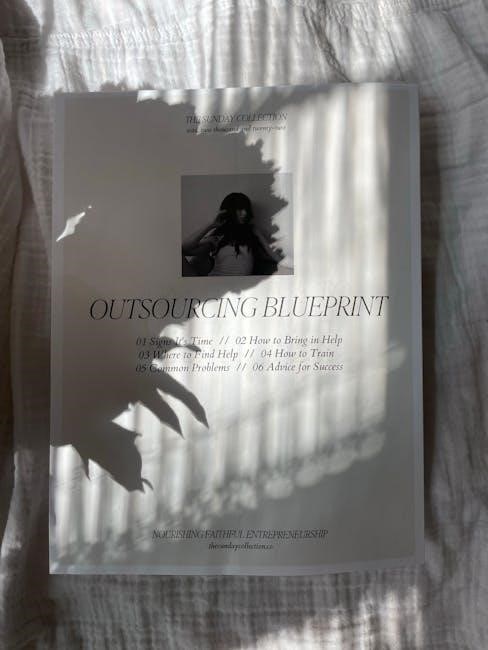Act III of Romeo and Juliet escalates the tragic conflict, with Mercutio’s death, Romeo’s banishment, and Juliet’s emotional turmoil intensifying the feud’s devastating consequences.
1.1. Overview of Act III
Act III is a pivotal section, marked by escalating tensions and tragic events. Mercutio’s death at Tybalt’s hand sparks Romeo’s vengeance, leading to Tybalt’s death and Romeo’s banishment. Juliet faces emotional turmoil upon learning of Romeo’s fate, while the Nurse plays a crucial role in delivering devastating news. The act explores themes of impulsive behavior, loyalty, and fate, setting the stage for the play’s heartbreaking conclusion.
1.2. Key Themes in Act III
Act III delves into themes of fate, love versus hate, loyalty, and impulsive behavior. Mercutio’s death and Romeo’s banishment highlight fate’s role. Love versus hate is evident in Romeo’s vengeance and Juliet’s emotional turmoil. Loyalty is tested through friendships and family ties. Impulsive actions drive tragic outcomes, emphasizing the destructive nature of unchecked emotions and the inevitable collision of the characters’ destinies.

Scene 1: The Fight Between Mercutio and Tybalt
Scene 1 sets the tragic tone with Mercutio’s death, escalating the feud. Benvolio predicts a fight due to the hot weather, and tensions rise as Mercutio and Tybalt clash, leading to Mercutio’s fatal stabbing and Romeo’s vengeful retaliation.
2.1. Why Benvolio Thinks a Fight Will Occur
Benvolio believes a fight will occur because of the hot weather, which he thinks will provoke tempers and lead to conflict. He also fears Tybalt’s hatred for Romeo and Mercutio’s fiery personality, predicting a clash. His concerns are validated as tensions escalate, setting the stage for tragedy.
2.2. Mercutio and Tybalt’s Argument
Mercutio and Tybalt’s argument begins with Tybalt’s taunts about Romeo’s absence at the ball, calling him a coward. Mercutio, defending Romeo, engages in a witty but heated exchange, challenging Tybalt to a duel. The confrontation quickly turns violent, highlighting the deep-seated hatred and pride between the Montagues and Capulets, which ultimately leads to Mercutio’s fatal stabbing.
2.3. Romeo’s Attempt to Stop the Fight
Romeo intervenes in the duel between Mercutio and Tybalt, refusing to fight because he is now Tybalt’s kinsman through his marriage to Juliet. He pleads for peace, but his efforts fail as Mercutio, angered by Tybalt’s insults, draws his sword. Romeo’s attempt to stop the fight inadvertently leads to Mercutio’s fatal stabbing, showcasing the tragic consequences of his well-meaning but misguided intervention.
2.4. Mercutio’s Death and Its Impact
Mercutio’s death at Tybalt’s hand sparks a chain of tragic events. His final words, “A plague o’ both your houses,” foreshadow the devastating consequences for the feuding families. Romeo, filled with grief and anger, kills Tybalt, leading to his banishment. Mercutio’s loss also deepens Romeo’s emotional turmoil and accelerates the play’s tragic momentum, highlighting the senseless violence and irreparable damage caused by the ongoing feud.
Scene 2: Juliet’s Reaction to the News
Juliet’s world collapses upon learning of Romeo’s banishment and Mercutio’s death. Her shock turns to despair, revealing her deep emotional dependence on Romeo and her hopeless future.
3.1. Juliet’s Soliloquy and Emotional State
Juliet’s soliloquy in Act III, Scene 2, reveals her profound emotional turmoil. Upon learning of Romeo’s banishment and Mercutio’s death, she transitions from hope to despair, showcasing her deep dependence on Romeo. Her soliloquy highlights her inner conflict, as she grapples with the loss of her love and the shattered future, demonstrating her maturation and the intensity of her emotional suffering amidst the tragic events unfolding around her.
3.2. The Nurse’s Role in Delivering the News
The Nurse delivers the devastating news of Mercutio’s death and Romeo’s banishment to Juliet, her emotional distress evident as she conveys the tragedy. Her loyalty to Juliet is clear, yet her blunt honesty intensifies Juliet’s despair. The Nurse’s role underscores her deep concern for Juliet, highlighting her emotional connection and the gravity of the situation, which deepens Juliet’s sense of isolation and hopelessness.
Scene 3: Romeo’s Banishment
Romeo faces banishment after killing Tybalt, a punishment decreed by the Prince. His emotional turmoil and desperation are evident as he seeks solace from Friar Laurence.
4.1. Romeo’s Reaction to Tybalt’s Death
Romeo is devastated by Tybalt’s death, overwhelmed by guilt and grief. He realizes the consequences of his actions, leading to emotional turmoil and a sense of doom. His reaction underscores the tragic escalation of the feud and his own internal conflict, as he grapples with the repercussions of his impulsive behavior and the inevitable fallout that follows.
4.2. The Prince’s Punishment
The Prince, angered by the ongoing violence, banishes Romeo from Verona for killing Tybalt. This judgment reflects the Prince’s attempt to restore order and end the feud. Romeo’s exile separates him from Juliet, intensifying the tragic consequences. The punishment highlights the societal impact of the families’ hatred and sets the stage for the play’s devastating conclusion.
4.3. Romeo’s Emotional Struggle
Romeo is overwhelmed by grief and guilt after killing Tybalt, leading to his banishment. He struggles with the consequences of his actions, feeling abandoned and desperate. His emotional turmoil deepens as he faces separation from Juliet, highlighting his internal conflict between love and vengeance. Romeo’s despair reflects the tragic fallout of the feud and his own impulsive decisions.

Scene 4: The Secret Marriage and Plans

Romeo and Juliet’s secret marriage deepens their commitment, but their plans to flee Verona highlight the urgency and risks of their love amidst the escalating feud.
5.1. Romeo and Juliet’s Secret Marriage

In Act III, Romeo and Juliet’s secret marriage, officiated by Friar Laurence, signifies their deep love and commitment. The ceremony, held in Friar Laurence’s cell, is a private vow between the two lovers, symbolizing their unity despite the feud. Romeo and Juliet exchange rings, solidifying their bond, while Friar Laurence hopes the union will end the families’ hatred. Their secret marriage underscores the urgency and risks of their love, heightening the play’s tension and tragedy.
5.2. Plans to Flee Verona
Romeo and Juliet devise a plan to escape Verona following Mercutio’s death and Romeo’s banishment. Friar Laurence arranges for Juliet to fake her death using a potion, allowing her to reunite with Romeo in Mantua. This desperate scheme underscores their determination to be together despite the escalating feud and tragic circumstances surrounding them, showcasing their unwavering love and the dire risks they are willing to take.

Character Analysis
Romeo’s impulsiveness intensifies, while Juliet shows maturity. Tybalt’s hatred deepens the feud, and Mercutio’s death serves as a catalyst for the tragic events unfolding.
6.1. Romeo’s Transformation in Act III
Romeo transitions from a passionate lover to a grieving avenger. His refusal to fight Tybalt, due to their secret marriage, highlights his internal conflict. However, Mercutio’s death shatters his restraint, leading to impulsive vengeance. This pivotal moment reveals Romeo’s struggle between love and rage, ultimately sealing his fate with banishment and deepening his emotional turmoil.
6.2. Juliet’s Maturation
Juliet evolves from an obedient daughter to a determined individual. Her soliloquy in Act III showcases her emotional depth and resolve. Upon learning of Romeo’s banishment, she defies her parents and refuses to marry Paris, demonstrating courage and independence. Her maturity is evident as she takes control of her destiny, revealing a strong-willed woman willing to face consequences for her love and beliefs.
6.3. Tybalt’s Role in the Conflict
Tybalt’s hatred for the Montagues fuels the conflict in Act III. His aggressive behavior leads to the fatal fight with Mercutio, resulting in Mercutio’s death and Romeo’s revenge. Tybalt’s death at Romeo’s hands escalates the feud, prompting Romeo’s banishment and intensifying the tragic consequences. His actions highlight the destructive nature of vendetta and pride, driving the play’s momentum toward its devastating conclusion.
6.4. Mercutio’s Significance
Mercutio’s vibrant personality and loyalty to Romeo make him a pivotal character. His tragic death at Tybalt’s hand sparks Romeo’s rage and subsequent banishment, escalating the play’s tragic momentum. Mercutio’s wit and fiery nature contrast with Romeo’s romantic idealism, highlighting the destructive nature of the feud. His death serves as a turning point, deepening the emotional and moral complexity of the story.

Themes and Motifs in Act III
Themes of fate, love, hate, loyalty, and betrayal dominate Act III, with motifs like impulsive decisions and tragic consequences shaping the characters’ destinies.
7.1. Fate and Destiny
Fate and destiny play a central role in Act III, as characters’ actions and decisions are driven by forces beyond their control. Mercutio’s death and Romeo’s subsequent banishment underscore the inevitability of tragic outcomes. The characters’ belief in fate, such as Romeo’s sense of doom, highlights the unavoidable path toward destruction, emphasizing the theme of destiny shaping their lives and the ultimate tragic conclusion of the play.
7.2. Love vs. Hate
Act III vividly portrays the clash between love and hate, as Romeo’s affection for Juliet contrasts sharply with the violent hatred between their families. Mercutio’s death and Romeo’s retaliatory killing of Tybalt highlight how hate escalates conflict, while Juliet’s unwavering devotion to Romeo underscores the enduring power of love amidst chaos. This duality drives the tragic progression of the play, emphasizing the destructive nature of hate and the redemptive potential of love.
7.3. Loyalty and Betrayal
Act III explores loyalty and betrayal through key characters. Romeo’s loyalty to Mercutio leads him to avenge his friend, betraying his peaceful vows. Juliet remains loyal to Romeo despite her family’s opposition, while the Nurse’s loyalty wavers as she struggles with the tragic events. These conflicts highlight how loyalty can lead to betrayal, intensifying the play’s emotional depth and tragic outcomes, ultimately shaping the characters’ destinies.

Literary Devices in Act III
Shakespeare employs dramatic irony and vivid imagery to heighten tension. Mercutio’s dying remarks and Romeo’s emotional struggles showcase metaphorical language, emphasizing fate and emotional depth, driving the tragedy forward.
8.1. Dramatic Irony
Dramatic irony in Act III heightens tension as the audience anticipates tragic outcomes. Romeo’s refusal to fight Tybalt, due to his secret marriage, leads to Mercutio’s death, a pivotal moment. Juliet’s belief that Romeo is dead, while he is merely banished, deepens emotional conflict. The Prince’s punishment and the lovers’ secret plans further illustrate the inevitable doom, engaging the audience with foresight of the devastating conclusion.
8.2. Imagery and Metaphors
In Act III, Shakespeare employs vivid imagery and metaphors to intensify emotional depth and highlight themes. The hot, tense atmosphere in Scene 1 mirrors the characters’ heightened emotions. Mercutio’s wound is described as “under your arm,” creating a stark visual of betrayal. Juliet’s soliloquy uses metaphorical language, comparing her heart to a “heavy burden,” emphasizing her despair. These devices underscore the tragic progression and deepen the audience’s connection to the characters’ struggles.
Study Questions and Analysis

Engage with Act III through multiple choice and short answer questions, analyzing key quotes, plot twists, and character motivations to deepen understanding of the tragic events.
9.1. Key Questions for Act III
Why does Benvolio believe a fight will occur at the start of Scene 1?
How does Romeo attempt to stop the fight between Mercutio and Tybalt?
What motivates Romeo to kill Tybalt after Mercutio’s death?
How does Juliet react upon learning of Romeo’s banishment?
What role does the Nurse play in delivering the tragic news to Juliet?
How does Romeo’s emotional state change throughout the act?
What symbolic significance does Mercutio’s death hold?
How does the Prince’s punishment reflect the ongoing feud?
What plans do Romeo and Juliet devise to escape Verona?
How does Act III’s events alter the play’s tragic trajectory?
9.2. Critical Analysis of Scenes
Scene 1’s tragic fight highlights Mercutio’s fiery temperament and Romeo’s reluctant involvement, showcasing the destructive nature of the feud. Scene 2 reveals Juliet’s emotional depth as she grapples with loss and betrayal. Scene 3 underscores Romeo’s despair and the Prince’s stern justice, while Scene 4 emphasizes the lovers’ desperate plan to escape. These scenes collectively accelerate the play’s tragic momentum, deepening themes of fate, love, and impulsive decisions.
Act III intensifies the tragic conflict, leading to irreversible consequences, while deepening the exploration of love, fate, and impulsive decisions that shape the play’s ultimate heartbreaking outcome.
10.1. Summary of Act III
Act III centers on escalating conflicts and tragic events. Mercutio’s death at Tybalt’s hand leads to Romeo’s vengeful killing of Tybalt, resulting in his banishment. Juliet learns of Romeo’s fate, while the lovers secretly marry. The act deepens emotional tensions, highlighting impulsive decisions and fate’s relentless march toward tragedy, setting the stage for the play’s devastating conclusion.
10.2. Impact of Act III on the Play’s Outcome
Act III’s tragic events accelerate the play’s inevitable conclusion. Mercutio’s death and Romeo’s banishment escalate the feud’s violence, while Juliet’s desperation intensifies her emotional struggle. The act’s pivotal moments—Romeo’s impulsive decisions and Juliet’s secret marriage—propel the story toward its heartbreaking resolution, solidifying the themes of fate, love, and conflict that define the tragedy.